| Srl | Item |
| 1 |
ID:
092403
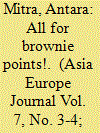

|
|
|
|
|
| Publication |
2009.
|
| Summary/Abstract |
The emergence of a global new media model aided by the technological revolution of the twenty-first century, economic globalization and political neo-liberalism, has transformed the traditional old model of media as a democratic pillar of public service into a new profit-oriented model of media as a corporate business enterprise primarily dependent on advertisement revenues. This change in the media ownership has had significant negative implications for media coverage and content. In this changed scenario of eclipse of investigative and critical journalism and triumph of infotainment journalism, this new corporate media, especially in the post-9/11 era, has nonetheless made itself particularly vulnerable to the terrorist manipulation of mass media as an advertisement agent for terror. Through the specific case study of the media coverage of Mumbai terror attacks on November 26, 2008, this study attempts to reveal how the commercial agenda of the new media ends up furthering the terrorist agenda, albeit in immediate short run, of inculcating mass hysteria, irrational mob fury directed against the state thereby eroding, however temporarily, popular sovereignty of the state.
|
|
|
|
|
|
|
|
|
|
|
|
|
|
|
|
| 2 |
ID:
020477
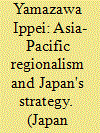

|
|
|
|
|
| Publication |
Fall 2001.
|
| Description |
203-221
|
|
|
|
|
|
|
|
|
|
|
|
|
|
|
|
| 3 |
ID:
192424
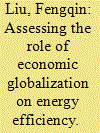

|
|
|
|
|
| Summary/Abstract |
There has been concern that economic globalization will increase energy consumption and reduce energy efficiency. A slew of studies investigating this assertion have used trade, foreign investment, or both as indicators of economic globalization, with mixed findings. A number of concerns challenge the empirical literature including measurement issues, infrequent temporal variations in the data, business cycle effects and heterogeneity bias, which affect the causal ability of economic globalization. This study used global data of 141 countries to assess the effects of economic globalization on energy efficiency. Our identification strategies involved using more refined measures of economic globalization and energy efficiency, addressing infrequent temporal variations as well as business cycle effects and concerns of heterogeneity bias. Largely, economic globalization positively drives energy efficiency, but this effect suffers from upward bias without controls. We note that infrequent temporal variations in the data and business cycle effects and heterogeneity bias drive the result. Concerning the latter, the result has shown that economic globalization improves energy efficiency only in upper-middle and lower-middle income countries and not in high and lower-income countries. Our results raise serious caution about the causal abilities of existing studies. And we discuss the policy implications.
|
|
|
|
|
|
|
|
|
|
|
|
|
|
|
|
| 4 |
ID:
056835
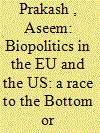

|
|
|
| 5 |
ID:
111705
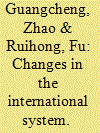

|
|
|
| 6 |
ID:
101980


|
|
|
|
|
| Publication |
2010.
|
| Summary/Abstract |
As a movement defending the interests of the wealthier northern regions of Italy, the Lega Nord proposes a nation-building discourse emphasising the successful insertion of Padania (i.e. northern Italy) in the global economy. While its rhetoric exalts the virtues of a liberal economic model, in recent years, the party has also defended the exclusive right of Padania to economic protection. This economic protectionism finds a parallel in the party's defense of cultural identity, although this identity equally expresses the capacity of Padanians to participate in the global economy. This defence intends to assign Padanians a privileged position in their territory and hence proposes discriminatory practices towards outsiders, especially immigrants. The party thus solves the tension between its legitimisation of and resistance against globalisation by proposing an asymmetric model of globalisation that envisions an internal and international political order based on unequal rights and obligations - and thus privileges for Padania.
|
|
|
|
|
|
|
|
|
|
|
|
|
|
|
|
| 7 |
ID:
138901
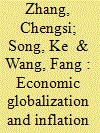

|
|
|
|
|
| Summary/Abstract |
This paper evaluates whether globalization has increased the role of global factors in driving inflation in China. Unlike other published studies on the relationship between globalization and inflation, which mostly use Phillips curve models, this paper uses multivariate dynamic models to examine the dynamic interactions between globalization and inflation in China. Empirical results with quarterly data spanning from 1995 to 2012 show that the global output gap significantly affects the dynamics of inflation in China. In particular, the global output gap is superior to the domestic output gap in predicting domestic inflation. Impulse response and variance decomposition analyses reinforce this finding. Our results indicate that the central bank of China should take developments in global output into account in its monetary policy-making process.
|
|
|
|
|
|
|
|
|
|
|
|
|
|
|
|
| 8 |
ID:
056639
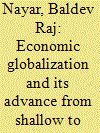

|
|
|
| 9 |
ID:
052178
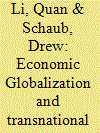

|
|
|
|
|
| Publication |
April 2004.
|
| Summary/Abstract |
The effect of economic globalization on the number of transnational terrorist incidents within countries is analyzed statistically, using a sample of 112 countries from 1975 to 1997. Results show that trade, foreign direct investment (FDI), and portfolio investment have no direct positive effect on transnational terrorist incidents within countries and that economic developments of a country and its top trading partners reduce the number of terrorist incidents inside the country. To the extent that trade and FDI promote economic development, they have an indirect negative effect on transnational terrorism
|
|
|
|
|
|
|
|
|
|
|
|
|
|
|
|
| 10 |
ID:
192232
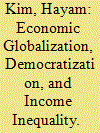

|
|
|
|
|
| Summary/Abstract |
In the last 40 years, East Asian countries have undergone significant economic and political transformation, with deepening integration into the world economy and substantial progress toward democracy. I investigate the impact of these two major developments on income distribution in East Asia. This study extends prior research by (1) examining the role of both international economic and domestic political factors, topics that have mostly been studied separately; (2) employing inequality data that are more complete than those used in previous studies; and (3) using data for a period during which the pace of globalization greatly accelerated, a major relevant event (the Asian financial crisis) occurred, and several countries in the region witnessed a considerable expansion of democratic rights. Evidence for the claim that trade increases inequality is robust, but empirical support for the redistributive effects of both foreign direct investment and democracy is weak.
|
|
|
|
|
|
|
|
|
|
|
|
|
|
|
|
| 11 |
ID:
112543
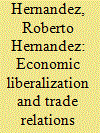

|
|
|
|
|
| Publication |
2012.
|
| Summary/Abstract |
This paper analyses the commercial relationship between Mexico and China in the context of the liberalization policies enacted by both countries. The policies were developed in the framework of economic globalization and worldwide strategic military power, starting from the end of the Cold War. Against this backdrop, the paper analyses the current trade relations between China and Mexico. The text emphasizes the public policy of both countries, presenting similarities and asymmetries along with the results of their commercial policies and specific business practices.
|
|
|
|
|
|
|
|
|
|
|
|
|
|
|
|
| 12 |
ID:
137188
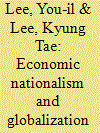

|
|
|
|
|
| Summary/Abstract |
In this article we explore whether South Korea's long-standing tradition of economic nationalism remains an appropriate development strategy, or whether this approach has been rendered irrelevant by the current wave of neoliberal globalization led by multinational corporations. We examine the changed economic agendas of each Korean regime, with a particular focus on national identity and economic nationalism, mobilized and implemented by the state. We argue that, despite the rapid development of globalization and cosmopolitanism in South Korea, economic nationalism is still prevalent. Korea's adoption of neoliberal economic activities, such as lifting trade barriers to encourage the inflow of foreign direct investment, was necessary to assist certain areas of the economy. Furthermore, changing the direction of the growth trajectory remains subordinate to the goal of state building. Empirical analysis of results collected from survey data and one-on-one interviews conducted in 2010 help to validate our hypothesis.
|
|
|
|
|
|
|
|
|
|
|
|
|
|
|
|
| 13 |
ID:
164720
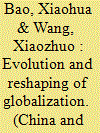

|
|
|
|
|
| Summary/Abstract |
With the weakening role of the World Trade Organization multilateral trading system, the globalization pattern is moving toward regional economic integration. As a result, the number of regional trade agreements (RTAs) has rapidly increased. New trends in international economics and trade, such as the withdrawal of the US from the Trans‐Pacific Partnership and the trade disputes between the US and China, have revealed the intention of the developed countries represented by the US to reshape the direction of globalization. This paper combines the relevant research conclusions and current stylized facts to examine the evolution and reshaping of globalization. We find that: (i) countries have different attitudes toward the recent round of globalization, which are related to changes in the patterns of income distribution within countries caused by the last round of globalization; and (ii) regional economic development is an effective way to reshape globalization. The self‐strengthening effect of the hub country in the trade network has promoted global RTA expansion.
|
|
|
|
|
|
|
|
|
|
|
|
|
|
|
|
| 14 |
ID:
084557
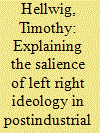

|
|
|
| 15 |
ID:
126246
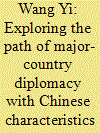

|
|
|
| 16 |
ID:
133646
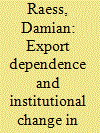

|
|
|
|
|
| Publication |
2014.
|
| Summary/Abstract |
This article explores the adjustment of wage bargaining institutions to international trade in Germany. Embracing IPE as opposed to CPE lenses yields a novel interpretation of change in the institution of wage bargaining. Export dependence of a sector, we argue, has destabilizing effects for industry-wide bargaining by sparking an intra-sectoral cleavage between domestic- and export-oriented enterprises. Specifically, the greater the degree of export dependence of a sector, the greater the degree to which domestic-oriented enterprises within that sector will abandon collective bargaining. We also explain how workplace employee representation through works councils mitigates this effect, such that the presence of works councils helps domestically oriented firms to hold to collective bargaining agreements in the face of a sector's deepening exposure to export markets. These claims find empirical support in the history of labor relations developments in the metal industry and, especially, in extensive analysis of a cross-section of establishments. Our findings attribute major responsibility to the firms driving globalization for undermining collective bargaining institutions and suggest that economic globalization is a cause of dualization. In all, the article provides fresh ammunition for a version of globalization-induced institutional convergence. [Correction added after online publication on May 28, 2014: "conversion" changed to "convergence" in preceding sentence.]
|
|
|
|
|
|
|
|
|
|
|
|
|
|
|
|
| 17 |
ID:
111775


|
|
|
| 18 |
ID:
133846
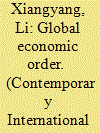

|
|
|
|
|
| Publication |
2014.
|
| Summary/Abstract |
After the end of the cold war, the global economy has been characterized by globalization. This is reflected in the growing transnational flow of goods, services and factors of production. It is also reflected in the global economic order and rules constraining transnational flows. Doubtless, the transnational flow of goods, services and factors of production can benefit participating countries.
|
|
|
|
|
|
|
|
|
|
|
|
|
|
|
|
| 19 |
ID:
056088
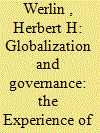

|
|
|
| 20 |
ID:
103010
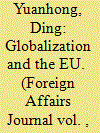

|
|
|